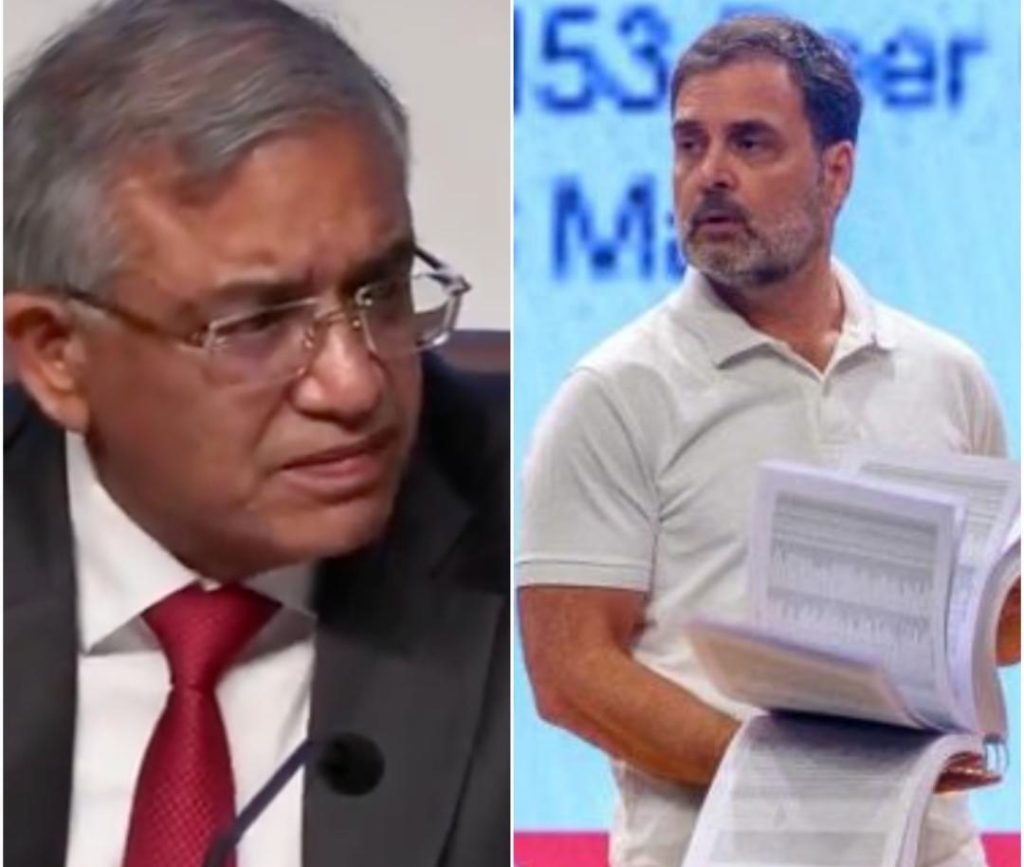
Vote Chori’ Phrase an Insult; Should We Share CCTV Footage of Mothers & Sisters Voting?: EC
The ongoing election season in India has witnessed a plethora of allegations and counter-allegations between political parties. Amidst this backdrop, the Chief Election Commissioner (CEC), Gyanesh Kumar, has expressed strong displeasure over the use of the phrase “vote chori” (vote theft) by Congress leader Rahul Gandhi. The term has been used by Gandhi to claim that elections are rigged in favor of the ruling party. In a recent statement, the CEC criticized the phrase, calling it an insult to the Constitution.
The CEC’s remarks have sparked a heated debate on social media, with many calling for the Election Commission to release surveillance footage from polling booths to prove or disprove allegations of vote rigging. However, in response to these demands, the CEC has raised concerns about voter privacy and has questioned whether it is appropriate to share CCTV footage of voters, including their mothers and sisters.
In a statement, the CEC emphasized that the Election Commission is committed to ensuring free and fair elections. However, he also stressed that the Commission cannot compromise on voter privacy. “Should the Election Commission share the CCTV videos of any voter, including their mothers, daughters-in-law?” the CEC asked, highlighting the potential harm that could arise from releasing such footage.
The CEC’s comments have been met with both support and criticism. While some have applauded his stance on protecting voter privacy, others have argued that transparency is essential to maintain trust in the electoral process. The debate has also raised questions about the role of technology in elections and the need to balance the use of surveillance cameras with the right to privacy.
The “vote chori” phrase, which has been used by Gandhi and other opposition leaders, is a reference to allegations of electoral fraud and malpractices. However, the CEC has argued that the term is an insult to the Constitution and undermines the democratic process. “We cannot allow any phrase or statement that undermines the faith of the people in the electoral process,” the CEC emphasized.
The CEC’s comments have also sparked a debate about the use of surveillance cameras in polling booths. While some argue that CCTV footage can help detect and prevent electoral fraud, others have raised concerns about the potential for misuse and the impact on voter privacy.
In India, the use of surveillance cameras in polling booths is not a new phenomenon. In fact, the Election Commission has been using CCTV cameras to monitor polling booths for several years. However, the CEC’s statement has highlighted the need to strike a balance between the use of technology and the right to privacy.
The debate has also raised questions about the role of political leaders in maintaining the integrity of the electoral process. While some have accused Gandhi and other opposition leaders of using the “vote chori” phrase to discredit the election process, others have argued that political leaders have a responsibility to speak out against electoral fraud and malpractices.
In conclusion, the CEC’s statement has sparked a heated debate about the role of technology in elections and the need to balance the use of surveillance cameras with the right to privacy. While the “vote chori” phrase has been used by political leaders to make allegations of electoral fraud, the CEC has emphasized that such phrases are an insult to the Constitution and undermine the democratic process.
As India continues to grapple with the challenges of ensuring free and fair elections, it is essential that all stakeholders work together to maintain the integrity of the electoral process. This includes political leaders, civil society organizations, and the Election Commission itself.
Source:






